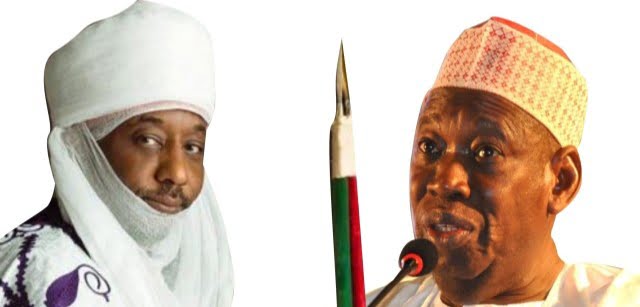Nigeria News
‘Ganduje Would Have Made My Life Miserable’ – Sanusi Opens Up On His Dethronement

The Emir of Kano, Muhammadu Sanusi II, has disclosed the reasons behind his decision not to contest his dethronement by the immediate past Governor of Kano State, Abdullahi Ganduje.
Naija News recalls that Ganduje had, before leaving office, dethroned the former Governor of the Central Bank of Nigeria (CBN) and subsequently banished him from the mega city in March 2020.
At the time, the development had stirred mixed reactions among concerned stakeholders.
However, Sanusi, who Governor Abba Kabir Yusuf’s administration recently reinstated, shed light on the incident, which happened years ago.
The Emir told Sun Newspaper that the Kano emirate is large and has a number of deserving people, which means he lacks the basic entitlement to hold the position of Emir.
When asked why he didn’t challenge his dethronment, Sanusi said, “A number of reasons. I have told you that I don’t have a fundamental right to be an Emir. I am one of hundreds of princes. God chose me. And if God says I should leave, for me, I take it that God knows better than me why I had to leave. Okay, let’s say I go to court. Let me even say this; I just got a letter that said I had been dethroned for insubordination.
“I had never been queried for insubordination.
“The details of the insubordination were not given. I had not been given any chance to defend myself. So, it was clear that the state and the federal governments had both decided that it was time for me to go. Okay?”
According to Sanusi, even if he had gone to court and the court returned him, he wouldn’t be able to hold the position with Ganduje as a governor.
Ganduje Would Just Make My Life Miserable
Sanusi added: “So, let’s even assume that the court said I should come back. Do you think I was looking forward to working with that government? Would I have been happy as an Emir in the last three years working with that government? You’re under a governor. The law gives him the power to be on top of you. He has said he doesn’t like you. He has made it clear he does not like you. If I came, he would just make my life miserable.
“It was going to be one story after the other. One fake story, one social media insult after another, and in my position, I won’t be able to respond. So, for me, I had a happier life in Lagos with my friends, publishing my book, doing my PhD, doing my UN work, doing my Tijaniya work, than sitting here in a constant fight with the government.
“Secondly, look at the Emir of Gwandu, who was removed under Obasanjo. How many years now? Almost 20. The state High Court said he was illegally removed, and returned him. So, there was an appeal. The Court of Appeal said he was illegally removed and returned him. It is at the Supreme Court. The Supreme Court has not yet spoken out about him. I mean, do I have 20 years to fight in court to come back to a throne?
“So, for me, I had been Emir for six years, alhamdulillah. I had done what I did. At least, the only reason I would have gone to court is if they had removed me on an allegation that harmed my reputation because the only currency I have is my integrity. So, if they had accused me of fraud or something, I would have had to go to court to clear my name, but they said insubordination.
“So, the governor was asked, what are the reasons for insubordination? He said, that sometimes he is invited to meetings, and he does not come. For every well-meaning Nigerian who saw that story, who saw that news, I don’t even need to defend myself because if you are going to remove an Emir and the only reason you can have is that you invite him for some meetings that he does not come, then nobody takes you seriously. Everybody knows that this was not the reason. So, I always felt that if it was God’s will that I come back, if not, I’d go and continue my life.
“So, I didn’t go to court to challenge my removal. I went to court to challenge their attempt to keep me in exile and under house arrest to enforce my fundamental human rights but I did not go to court to challenge the removal because I didn’t even have to because it was self-evident on the face of it that this was just a political act. So, that was why I didn’t challenge it.”












